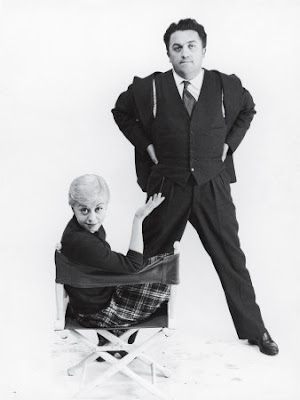
A traveling performer Zampano (Anthony Quinn) pays 10,000 lira to a hard-up mother of eight to secure a young girl named Gelsomina (Giulietta Masina) as his performing sidekick. Her older sister Rosa recently died while on the road as Zampano’s former assistant. Gelsomina, who is innocent in way of the world, becomes Rosa’s substitute, but life on the Italian road with the misogynistic busker isn’t easy! For the most part, Zampano is brutish and uncouth, with no hint of tenderness to his younger ward. When Gelsomina meets a tightrope artist they call Il Matto aka “The Fool” (The Clown), Gelsomina suddenly finds a charming friend who even advises her to stick it out with morose Zampano, who’s bitterly cross with Il Matto’s constant teasing. One fateful, bitterly cold day, Zampano finds Il Matto fixing his car on the road. They fight, and the unexpected happens!
Director Federico Fellini’s “La Strada” – “The Road” – is surprisingly contemporary in thematic pertinence. In fact I was quite surprised to find this masterpiece easily watchable. There have been two versions on where the Italian film master got his idea from: one, after a pig castrator in Fellini’s coastal town of Rimini (where he grew up) who “took all the girls in town to bed with him”; second, was from a scenario related to him by his scenarist Tullio Pinelli in one of his road trips through the mountains: “Along one of the tortuous winding roads, he saw a man pulling a carretta, a sort of cart covered in tarpaulin... A tiny woman was pushing the cart from behind. When he returned to Rome, he told me what he'd seen and his desire to narrate their hard lives on the road.”
Fellini's strength comes from his ability to deftly tell a story. When he was a child, he spent his leisure time drawing and staging puppet shows. He would field stories from children's magazines. He got his visual inspiration of Gelsomina from Opper's Happy Hooligan. In the last three weeks before finishing "La Strada", Fellini suffered early signs of clinical depression for which he undertook brief therapy.
“The Road” - La Strada - won Oscar’s 1956 Best Foreign Language Film, as well as Venice Filmfest’s Silver Lion.
Spoliers!
Anthony Quinn personifies the misogynist male who conveniently walks away from what would be his responsibility – as when he decided to abandon the shocked Gelsomina. In the twilight of his life, memories of the once-innocent girl has haunted Zampano’s waking hours. Guilt, after all, is not the easiest to walk away from.
If only contemporary movies were made like this...












